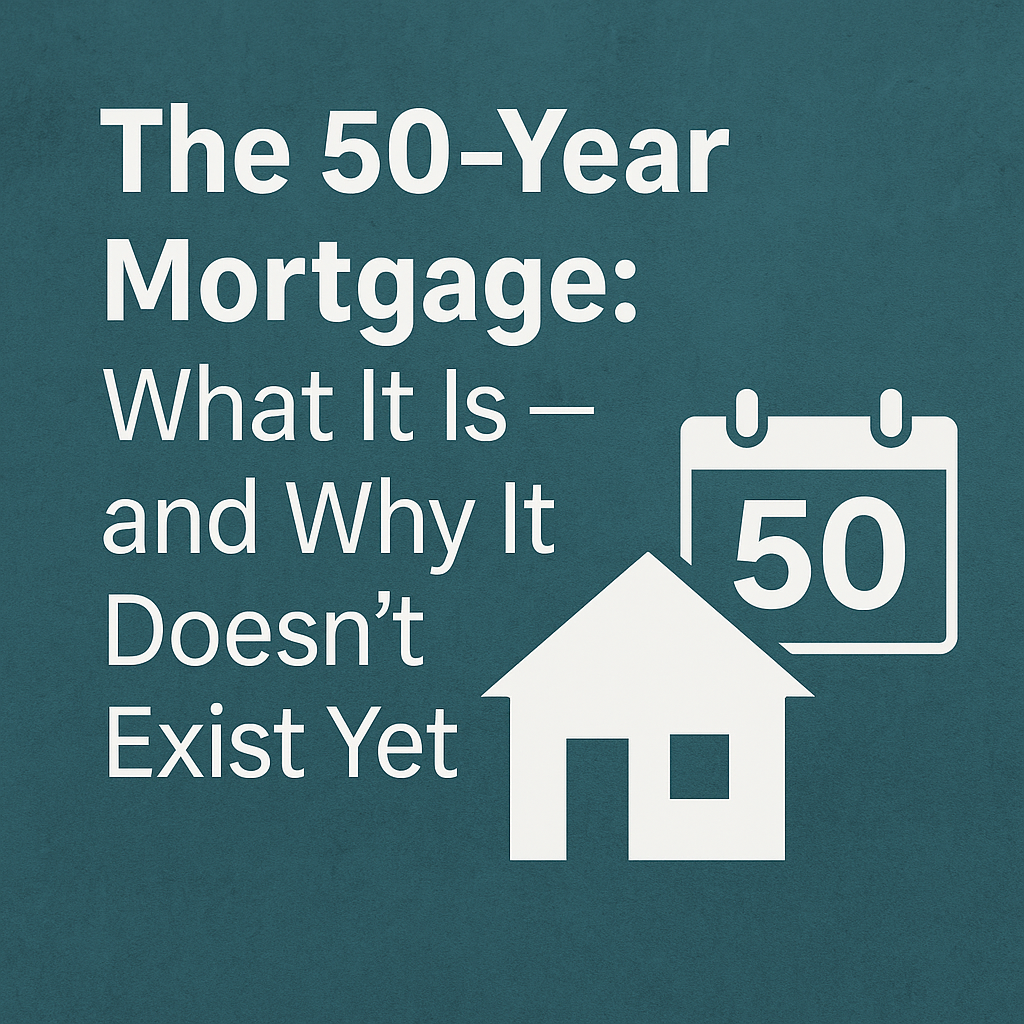Published November 11, 2025
50-Year Mortgages Explained: Future Game-Changer or Just a Headline?

🏠 The 50-Year Mortgage: Game-Changer or Gimmick?
What lenders aren’t telling you about those ultra-long-term loans.
You’ve probably seen the headlines: “50-Year Mortgage Approved!”
Sounds wild, right? On paper, longer terms mean smaller monthly payments — but the reality is more complicated. This concept is under discussion but not yet approved or commercially available in the U.S. mortgage market.
So if you’re reading this and thinking it’s an option today — just know: it’s still in the “idea” stage. The Washington Post+1
Let’s strip away the noise and look at what it would mean, the math, the pros & cons — so you’re ready if it becomes an option.
What a 50-Year Mortgage Actually Means
A 50-year mortgage would stretch your payments out over five decades instead of the traditional 30 years.
- The benefit: lower monthly payments for the same loan amount.
- The trade-off: more total interest paid, slower build-up of equity.
And again: direct approvals and GSE support are not in place as of now. Axios+1
It’s not new math—just a longer clock. For someone struggling to qualify or trying to buy in a high-priced market, that extra time could make the difference between renting and owning. For others, it could mean paying much more in interest and tying themselves to debt for decades.
Why Appreciation Usually Builds More Wealth Than Pay-Down
Here’s the often-missed point: most wealth from real estate doesn’t come from paying down the mortgage — it comes from home appreciation.
- Studies (for instance from the federal reserve system) emphasise that owning property long term tends to build wealth largely through value increases.
- A fixed monthly payment locks you into that growing asset leverage; the longer you hold, the more powerful the appreciation (assuming your market is healthy).
- Example: If homes appreciate at 3 % per year, a $300,000 home today could be worth around $403,000 in ten years—even if you don’t make extra principal payments.
So while loan-term matters, the biggest wealth driver often isn’t how fast you pay down the loan—it’s how much the home value rises.
30 Years vs 50 Years: The $300K Reality Check
Let’s use round numbers to show what this could look like:
(Keep in mind that 50-year loans are not yet standard, so these are hypothetical.)
| Loan Term | Rate Assumed* | Monthly Payment (P&I) | Total Interest (Approx.) | Years to Pay Off |
|---|---|---|---|---|
| 30 Years | 6 % | ~$1,798 | ~$347,500 | 30 years |
| 50 Years | 6 % | ~$1,439 | ~$563,400 | 50 years |
*Rates could differ in reality (50-year could cost more).
👉 A monthly savings of ~$359 compared to 30-yr in this simplified example.
If you held your budget to ~$1,800/month, a 50-yr term could allow you to take on a loan of perhaps ~$395,000 instead of $300,000—giving you more buying power.
But remember: the slower equity growth and higher total interest.
The Pros of a 50-Year Mortgage
- Increased affordability: Lower payment means more buyers might qualify or free up cash flow now.
- Flexibility: Useful if you expect rapid income growth later or want to invest cash elsewhere.
- Leverage on appreciation: If your market appreciates strongly, the longer term could still deliver meaningful value gains.
- Entry point: For first-time buyers locked out today, this might someday be a path in (once available).
The Cons of a 50-Year Mortgage
- More total interest: More years = more interest paid.
- Slower equity build-up: Early years will see far less principal reduction.
- Long-term debt burden: You could still owe decades into retirement.
- Riskier for resale/exit plans: If you move earlier, you may not have built enough equity to roll into your next home.
- Availability & approval risk: Since this product doesn’t exist in standard form yet, terms, rates, underwriting standards are uncertain.
When It Might Make Sense & When It Might Not
Might make sense if:
- You’re early in your career, expect future income growth, and want a lower payment now.
- The local market is solid for long-term appreciation.
- You prioritize flexibility over paying off fast.
- You fully understand the trade-offs and know you’re comfortable with slower equity build.
Might not be the best fit if:
- You’re relying on pay-down of principal for your wealth strategy.
- You expect to move in <10-15 years.
- You want to be mortgage-free sooner (e.g., for retirement).
- Your local market is stagnant or in decline.
My Take
The 50-year mortgage is not a gimmick, but it’s not a done deal either. As of today, it’s still a proposed tool — not yet approved or widely available.
If it comes, it could expand access. But it won’t magically solve housing affordability or replace the need for smart strategy.
Because most real-estate wealth comes from value growth + leverage, the term matters—but only as part of a bigger plan.
Bottom line:
Whether it’s 30, 40 or someday 50 years, the smartest mortgage is the one aligned with your life plan, not just the lowest monthly payment.
If you’d like to see how this concept could work for you (once available) — and what the numbers look like for Hernando County or your buying area — let’s run the projections together.






